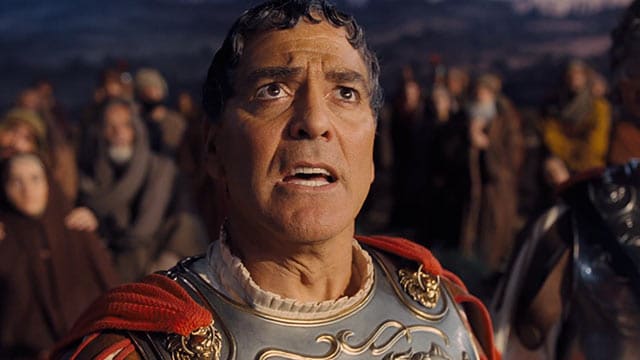Over the course of nearly 20 films, Joel and Ethan Coen have veered between low-key movies like “Blood Simple” and “Fargo,” and wildly inventive movies on a grand scale such as “The Big Lebowski” and “The Hudsucker Proxy.” Their newest opus, “Hail, Caesar!” marks yet another stylistic 180 degree turn from their prior release, the 2013 slice-of-life story “Inside Llewyn Davis.”
While that film followed a Dylanesque folk singer as he aimlessly drifted through Greenwich Village coffeehouses and meaningless affairs in 1961, “Caesar!” is about a Hollywood studio “enforcer” named Mannix (Josh Brolin) who has to find out what happened to one of the biggest stars in movies after he disappears from his latest set. That star, Baird Whitlock (George Clooney) , is a preening womanizer who often ends up drunk on set – so when he’s first noticed missing from the set of a biblical epic called “Hail, Caesar!” in which he plays a Roman soldier who becomes a devout believer in Jesus Christ, no one even considers that he’s actually been kidnapped.
Yet indeed he has, and Whitlock winds up waking up in an oceanfront Malibu home, detained by a group of blacklisted screenwriters who are holding him for ransom but are of course dividing that $100,000 request equally, like good Communists should. At first, Whitlock is shocked, but the more time he spends with his captors, the more he finds himself embracing their ideas, in humorous fashion.
Now, if “Hail, Caesar!” were just about those key elements, it would be enough plot for most normal filmmakers. But the Coens, who co-write and co-direct all their movies, are not average filmmakers. And their wild ambition is what trips them up here, as the film also follows the story of a cowboy superstar (Alden Ehrenreich, who nearly steals the show) whom the studio chief tries to turn into a romantic lead, to disastrous effect; a dance-movie starlet (Scarlett Johannson) who gets pregnant and has to find a husband quickly to avoid getting her loose living splashed across the dueling columns of twin gossip mavens; and Mannix’s own decision whether to keep his studio job or settle into the higher-paying status of an airplane manufacturing executive. Throw in an original Gene Kelly-worthy song and dance number led by Channing Tatum, plus a full song from a Busby Berkeley-style musical, and a humorous yet impressive stunt sequence from a Western, and it might sound like “Hail, Ceasar!” has pulle d out all the stops to be the most ingenious entertainment of our time. But beneath the nontop razzmatazz lies the most telling truth of all: that there’s simply too much being offered here, like an overstuffed Thanksgiving turkey that ultimately makes everyone who tastes it say, “Enough already!”
That is not to say that “Hail, Caesar!” is a disaster. Many of these scenes are entertaining or even awe-inspiring on their own, but it’s simply in putting them all together that the film becomes exhausting and starts to come apart at the seams.
The other main aspect of the movie that is hard to define is its attitude towards faith and religion. Several times in the movie – including the movie’s funniest scene, a battle royale of wits between a Catholic priest, a Jewish rabbi, a Protestant minister and a Greek Orthodox priest over how accurate the script of “Hail, Caesar!” is in describing the life of Christ – the script seems to be having good-natured fun with these topics and the divisions that have formed among mankind over the concept of a Messiah.
The movie is also clearly having a laugh at the overheated acting style found in many old-time Biblical epics, with Clooney delivering a climactic speech about the powerful impact of Christ in almost ridiculously over-the-top fashion. Most questionable of all is a throwaway gag in which the actor portraying Christ on the cross isn’t seen except for his feet, while a crew member takes his lunch order and they quibble over if he qualifies for a hot or cold lunch while the actor is clearly implied to be hanging on the cross.
But then, just as it appears to be crossing into sacrilege, the Coens pull the curtain back on Mannix’s life and reveal a man who is overly concerned with the state of his soul but is also undoubtedly sincere and treated with respect for it by the filmmakers. He may go to Confession so often that his priest begs him to give it a rest, but in moments of struggle, he also quietly prays the Rosary or walks across the studio lot in the dead of night to find answers and solace from God at the foot of the three crosses standing together on the set.
Basically, if you can have a few laughs at the expense of some of the most complex aspects of our Catholic faith, “Hail, Caesar!” may prove to be a surprisingly touching meditation under all the surface flash. But if you can’t stand any form of religious humor, steer clear. I think personally that the Coens’ portrayal of Mannix is a highly positive one and the movie stays on the right side of the line of taste.
But is it Dateworthy? That’s a tough call. I t can certainly foster conversation about how the movie handles faith and Catholicism, and as noted earlier, many individual scenes are stunning, but overall the movie can be exhausting. It really depends on how much these ideas sound good or bad to you from this review.
Ultimately, Mannix’s struggle over whether to continue working in the movies or find a more traditional career seems to be a metaphor for a struggle that the Coens themselves may have gone through. The fact that they have found a way to bring deep personal resonance to a movie that is also occasionally a mess in its eagerness to please makes it somewhat more endearing, even if it’s not always satisfying.



